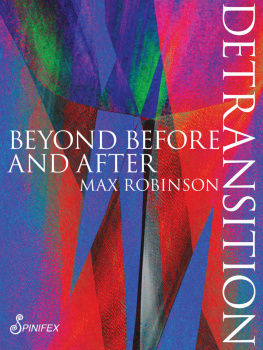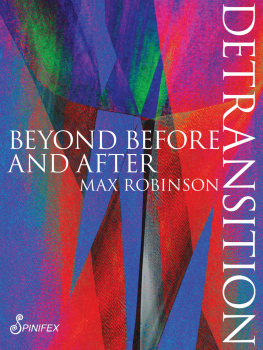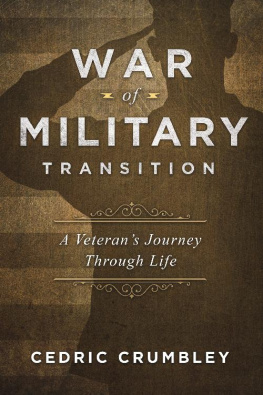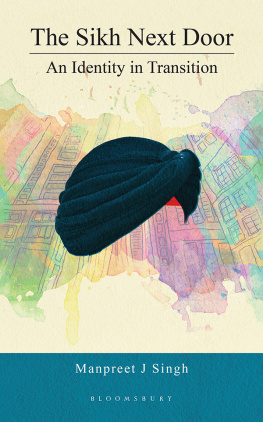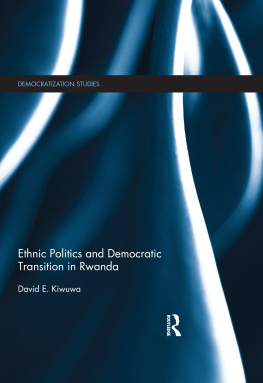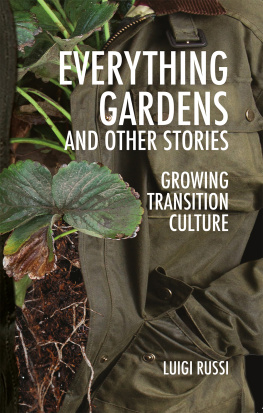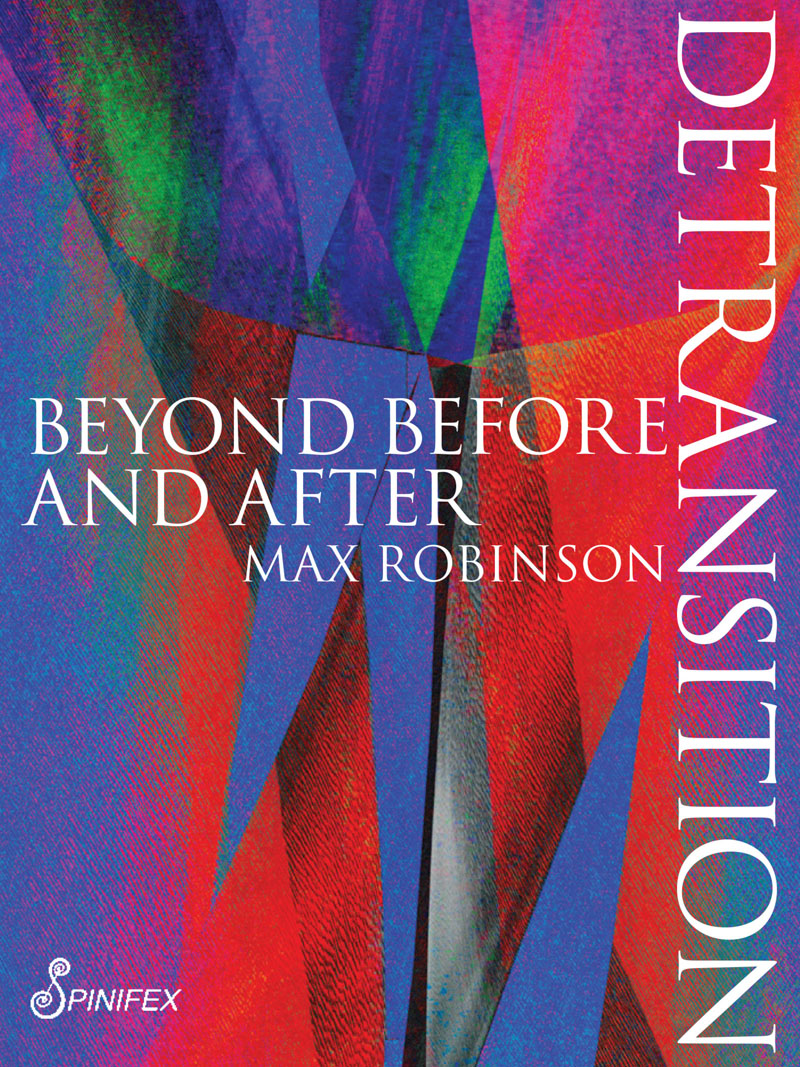

Max with Bourbon
Max Robinson became involved with lesbian feminism in an effort to make sense of her experiences with medical transition. She found it accomplished that and then some! Max provides direct support services for developmentally disabled women. She lives in southern Oregon with her partner Kitty and their dogs, cats, and captive-bred opae ula shrimp. Her other work includes a book of collages (Why is This Woman Smiling?), first person dog poetry (Laika), and lots of little tiny sculptures.
First published by Spinifex Press, 2021
Spinifex Press Pty Ltd
PO Box 5270, North Geelong, VIC 3215, Australia
PO Box 105, Mission Beach, QLD 4852, Australia
www.spinifexpress.com.au
Copyright 2021 Max Robinson
The moral right of the author has been asserted.
All rights reserved. Without limiting the rights under copyright reserved above, no part of this publication may be reproduced, stored in or introduced into a retrieval system, or transmitted, in any form or by any means (electronic, mechanical, photocopying, recording or otherwise) without prior written permission of both the copyright owner and the above publisher of the book.
Copying for educational purposes
Information in this book may be reproduced in whole or part for study or training purposes, subject to acknowledgement of the source and providing no commercial usage or sale of material occurs. Where copies of part or whole of the book are made under part VB of the Copyright Act, the law requires that prescribed procedures be followed. For information contact the Copyright Agency Limited.
Edited by Renate Klein, Pauline Hopkins and Susan Hawthorne
Guest editor: Kitty Robinson
Cover image by Estelle Disch
Cover design by Deb Snibson
Typesetting by Helen Christie, Blue Wren Books
Typeset in Minion Pro
Printed by McPhersons Printing Group

ISBN: 9781925950403 (paperback)
ISBN: 9781925950410 (ebook)
Contents
Introduction
There is no before. I dont know her. She was a child and Im grown up now.
There is no after. This could not have happened, and if it did, it wouldnt have happened to me.
Lost in the before/after narrative is everything except the packaging, in the most shallow and commercial sense. Every aspect of our humanity is abandoned in the pursuit of an easy storyone that challenges no one.
Mine is not a transsexual story but its not not a transsexual story. I dont think we have ever been perfectly extricable from each other, and anyway, naming our shared femaleness is more important to me than delineating where our neuroses diverge. Born in the wrong body, born in the right bodyeither way, the body I am talking about is the type that is expected to menstruate in perfect silence. The type of spectacle I am asked to become is something that women like me have often been asked to become when we refuse shame. Trace us throughout history and try to find any argument that any certain one of them, beyond any shadow of a doubt, was either a lesbian or transsexual. Its bullshit. The difference is smoke and mirrors, subjectivity, whatever you want to call it. We are women suffering in a way we have always been asked to suffer, relegated to life as dirty secrets and embarrassments.
Question: Who does it serve to position the lesbian and the female-to-male transsexual as truly separated from one another?
Answer: It serves parties with an investment in devaluing the importance of what we share: the perpetrators of patriarchy.
The fact that we ourselves (the lesbian we as well as the transsexual we) advance the argument of our difference may seem like a contradiction but it isnt. We are always fighting to justify our existence, both in private and in public, and the details of this negotiation change with our circumstances. Why shouldnt these justifications contradict each other, when our purposes sometimes find themselves at odds? Its something more and something less than a generational clash. The anger between us at times is sincere, but could be more honestly expressed elsewhere: toward the patriarchy.
I dont want us chasing each other in circles. We do this both because we have lost sight of our lesbian herstory and because we will not face our lesbian present. As Susan Leigh Star points out in To Dwell Among Ourselves (Star, 1978, p. 82), there is no real kindness without comprehending the dimensions of atrocity a woman has faced. Surviving together means naming the context that causes womens pain, the context that, in various ways, we all suffer within. Leigh Star quotes Adrienne Richs poem Natural Resources: But gentleness is active / gentleness swabs the crusted stump / invents more merciful instruments / to touch the wound beyond the wound / does not faint with disgust (Rich, 1977, p. 67).
I cannot touch the wound beyond the wound if I refuse to name that cutting into someone with a scalpel does harm to her. Julia Penelope, in A Cursory and Precursory History of Language (Penelope, 1976), reminds us that all honest speech requires risk-taking on the part of the speaker. Valuing a lack of conflict (a dishonest peace) between lesbians and females-to-male transgender people (FTMs) over frank discussion of our shared situation does no favors to us.
And I know, too, that some of you are sincerely romantically and sexually invested in men and refuse discussion of anything else. To the extent thats true, we part there on lesbianismbut how often is it true? Is it really often enough to make me crazy for thinking theres something to this connection between the FTM and the lesbian? I am entitled to describe my world as I see it, and I respect your right to do the same. Were all entitled to our own understanding of the cultural moments we live in. We dont have to agreebut we dont necessarily have to disagree, either.
I recognize your truth-telling and I am not calling you a liar when I say that when I told this story, what I meant was that I wanted to be seen as a living creature whose life deserved full consideration.
Its always been easier to come after each other than to talk about what we have in common. What has all the new language added, really? Most of what I have to say can be expressed without it. The conflict between our need to be seen as individually valuable and our group membership as lesbians is old. We live in stifled peace when we disappear and we are hounded when we dont.
Its possible to honor what our individual solutions have given us, the lives they may have saved, and still recognize the tragedy of the perceived isolation they require as sacrifice. We are not alone, and have never been. We are all around each other.
The attempt to transition from female-as-defined-by-men to male represents a devastating failure of lesbian imagination. For all the bravery we express in our attempt to transcend the limits men place on us, we have settledgrowing to more closely resemble them instead of moving towards ourselvesand we did not see the difference. We are unable to imagine ourselves except as something that men can see, and since men cannot perceive female reality (see Dale Spender, 1990), women cannot imagine who we actually are. As Jeffner Allen has pointed out, We walk in footprints we cannot fit (1986). We must ask ourselves a question she poses to the woman who tries to pour herself, one way or another, into fulfilling male expectations: Onto what am I holding, and why? (1986, p. 18).
Next page
